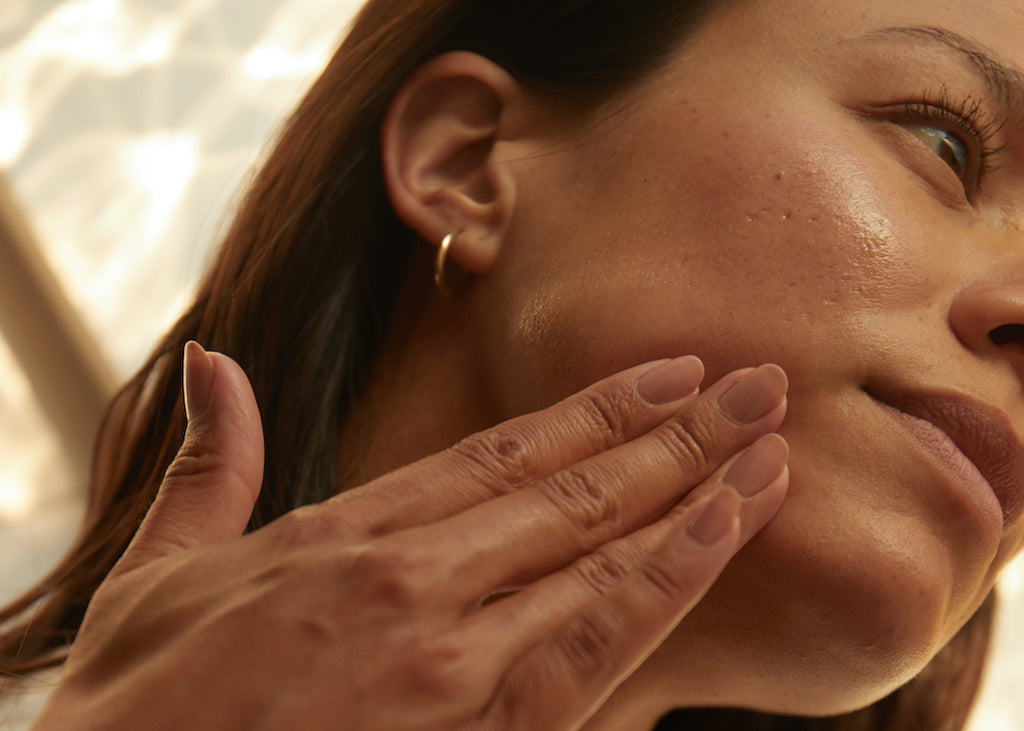5 WAYS TO SOOTHE SENSITIVE SKIN
WHAT CAUSES SENSITIVE SKIN?
Your outer skin layer (also known as your stratum corneum) functions as your natural skin barrier. This means that it prevents water from escaping and external irritants from entering. When your skin barrier health becomes compromised, you experience the effects of sensitive skin. This interference can be triggered by multiple factors, some of which are external such as; over-exfoliating, UV rays and using too many actives, and some that are internal such as stress, diet, and the natural ageing process.
When your skin barrier is compromised it is more susceptible to irritants, so even a small amount can infiltrate your barrier and trigger an inflammatory response. This is your body’s immune system naturally trying to fight off invading substances and very often results in inflammation and redness - both telltale signs of sensitive skin.

SIGNS OF SENSITIVE SKIN
- Burning, stinging, itching and tightness
- Redness
- Rash or swelling
- Sensitive to touch
- Rough and scaly skin
- Discomfort in very hot or very cold weather
- Heightened sensitivity to some skincare products
WHO'S PRONE TO SENSITIVE SKIN?
Sensitive skin affects both men and women (1). If you have a dry skin type you’re more likely to be prone to sensitivity as your skin is lacking natural oils - a key natural component for maintaining your skin’s barrier function. But skin sensitivity can develop later in life, due to the natural depletion of some essential skin substances which defend your skin barrier.
You might be more prone to having sensitive skin if you’ve been diagnosed with an underlying skin condition, such as rosacea or eczema. Rosacea is a chronic inflammation which affects 1 in 10 individuals (2). One of the most common symptoms is redness, but it can also develop broken blood vessels and inflamed acne. Eczema, also known as atopic dermatitis, is a skin condition in which your skin’s lipid matrix (the part that holds your skin cells together) is incomplete. (3) This results in an impaired skin barrier, which causes sensitive skin.

WHAT TRIGGERS SENSITIVE SKIN?
The triggers of sensitive skin are personal to you, so try keeping a skin diary, where you track skincare products, ingredients and other triggers which you potentially may find irritating. Some well known triggers for sensitive skin include:
- Essential oils & fragrance
- Dyes & Jewellery
- Certain skincare actives
- Sun exposure
- Seasonal changes
- Alcohol and specific foods
- Laundry detergent
- Stress
IS ‘HYPOALLERGENIC’ SKINCARE BETTER FOR SKIN?
The term ‘hypoallergenic’ suggests that the skincare product is less likely to cause allergic reactions, however there is no medically reviewed definition or any tests for the product to gain this title. That means that the product might still contain ingredients which irritate sensitive skin. Instead skim the INCI (ingredient list) on the back of your new product for any potential triggers.
5 WAYS TO SOOTHE SENSITIVE SKIN
- Simplify your skin care routine. Strong actives e.g. AHAs and retinol can irritate your skin so try stripping back your routine to focus only on cleanser, moisturiser and spf. Remember less is more when it comes to skincare, especially for sensitive skin.
- Patch test any new skin care products. Apply a small amount in the space between your hairline and behind your ear, then leave overnight. If you don’t experience a skin reaction, you’re good to go.
- Repair your barrier. Dryness and irritated skin go hand in hand, so keep your face nourished with barrier-repairing ingredients such as ceramides and plant oils, especially those high in linoleic and linolenic acid. .
- Wear sunscreen daily as UV rays can weaken your impaired barrier further. Choose physical sunscreen ingredients (e.g zinc oxide and titanium dioxide), which aren’t as irritating as chemical sunscreen ingredients (e.g. oxybenzone and avobenzone).
- Use lukewarm water when cleansing. People believe cold water calms irritation, yet it isn’t as effective at breaking down products. However water that is too hot can burn and cause further inflammation, so meet in the middle with lukewarm temperature.
SUMMARY
- A compromised skin barrier makes you more prone to irritants
- Signs include redness, burning and stinging
- Skin conditions like rosacea and eczema can cause sensitive skin
- Sensitive skin triggers are personal to you
- Treatment for sensitive skin begins with repairing your skin barrier and avoiding your personal triggers
This article’s intention is to educate, not to provide medical advice. Always speak to a medical professional or certified dermatologist first.
